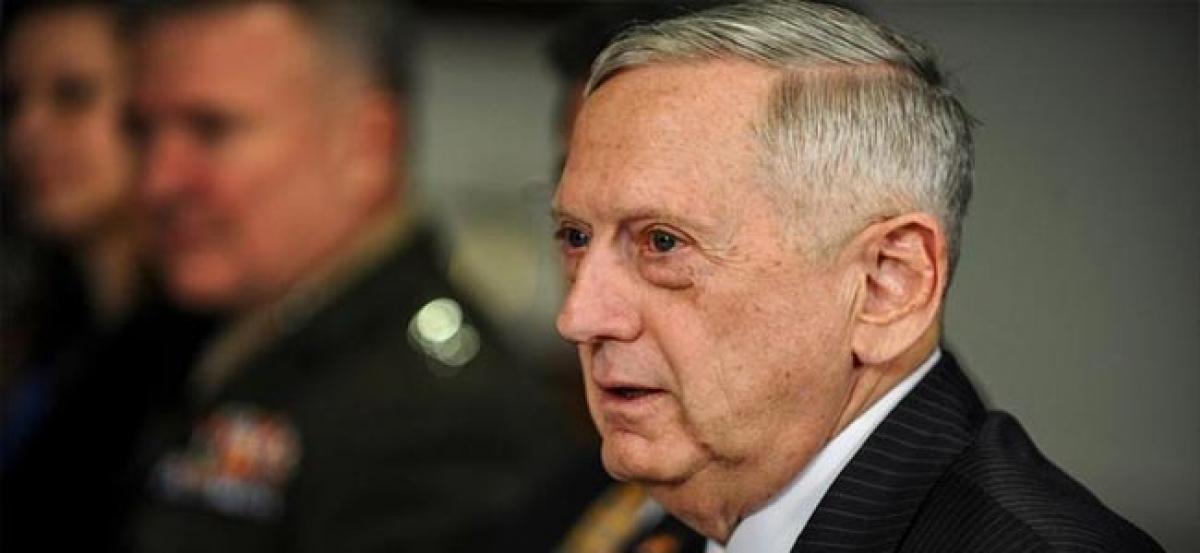Live
- National Energy Conservation Day: Fostering a sustainable future
- RG Kar issue: Day-long protests in Kolkata today on bail to Ghosh, Mondal
- Plans afoot to bring EPFO service at par with banking: LabourSecy
- vivo unveils X200 series of mobiles
- Sensex, Nifty stage a surprise recovery
- Govt commits to tackling maternal healthcare, deaths
- Capex to touch Rs 11.11-trn target this fiscal
- HCLTech launches TechBee
- Industrial growth recovery expected in H2
- No arrests made yet, says Police Commissioner
Just In

President Donald Trump\'s defense secretary sought to reassure NATO of steadfast U.S. support at talks in Brussels on Wednesday, as nervous European allies tried to look past Trump\'s rhetoric and the turmoil within his administration.
BRUSSELS: President Donald Trump's defense secretary sought to reassure NATO of steadfast U.S. support at talks in Brussels on Wednesday, as nervous European allies tried to look past Trump's rhetoric and the turmoil within his administration.
Jim Mattis, on his debut trip to Europe as Pentagon chief, said the president firmly backed the North Atlantic Treaty Organisation. As a candidate, Trump fiercely criticised NATO and appeared to question its value.
"The alliance remains a fundamental bedrock for the United States," Mattis said in brief remarks to reporters before talks got fully under way.
Back in Washington, Trump's administration has been jolted by the resignation of national security adviser Michael Flynn over his contacts with Russia's ambassador. U.S. intelligence agencies have accused Moscow of interfering in the 2016 U.S. presidential election.
Mattis signalled that Russia was firmly on NATO's agenda.
"The events of 2014 were sobering," he said, referring to Moscow's annexation of Ukraine's Crimean peninsula. "And we must continue to adapt to what's being revealed to us in terms of our security challenges."
Flynn had been seen in Moscow as a leading advocate of warmer ties with Russia and his departure has dented hopes of a thaw in relations with the West.
NATO Secretary General Jens Stoltenberg dismissed concerns about the turmoil or U.S. backing for NATO.
"I'm absolutely certain that the message of this meeting will be a message of transatlantic unity, of the importance of that we stand together and protect each other, and a very strong commitment of the United States to NATO," he told reporters.
Britain's defence secretary echoed that sentiment.
"There is no uncertainty about America's commitment to NATO," Michael Fallon told reporters when asked about Flynn's resignation. Denmark's Claus Hjort Frederiksen said everything he had heard was "calming and reassuring."
BUT IN PRIVATE...
Despite the public posturing, European allies are expected to privately seek details from Mattis about Trump's attitude toward NATO, which has guaranteed Europe's security for almost 70 years.
Trump has deeply unsettled allies with his contradictory remarks on NATO - calling it "obsolete" - and with his praise for Russian President Vladimir Putin.
Moscow's annexation of Crimea, and its direct support for rebels in eastern Ukraine have prompted NATO to begin sending troops to Russia's borders to deter the Kremlin from any other moves. The White House said on Tuesday that Trump expected Russia to hand back Crimea to Ukraine.
One senior European NATO diplomat said allies were under no illusion that Trump could yet undo careful diplomatic work with a single message on Twitter. But they would still look for his support as they try to manage tensions with Russia.
"We need to bring the family together," the diplomat said. "Things have been made to feel fragile."
Mattis is set to echo longstanding U.S. calls that European allies invest more on defence, something his predecessors under Republican and Democratic administrations have done for years.
But experts say that message will have to be calibrated. NATO Europe argues it is increasing defence spending, upping outlays by $10 billion last year.
NATO defence ministers from Europe, Canada and Turkey will also want to hear from Mattis, who will be first to address the 27 other defence ministers on Wednesday, on how the alliance can meet Trump's demands to do more to counter Islamist militants.
NATO says it is already active, training troops from Afghanistan to Iraq, and cannot do the work of police or social workers in detecting fighters returning to the West from Syria.
"We need to be clear that the response to international terrorism cannot be led by NATO, but it can a part of that," a second senior European NATO diplomat said.

© 2024 Hyderabad Media House Limited/The Hans India. All rights reserved. Powered by hocalwire.com







